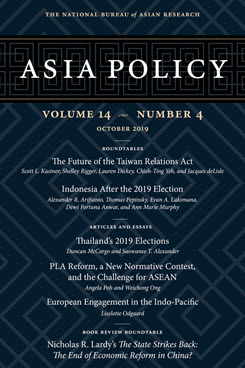PLA Reform, a New Normative Contest, and the Challenge for ASEAN
This article examines how reforms of the People’s Liberation Army (PLA) since 2015 have enhanced China’s ability to more effectively challenge the U.S. in the Asia-Pacific, both through military operations and through contesting international and regional norms that China perceives as contrary to its interests.
EXECUTIVE SUMMARY
MAIN ARGUMENT
Since 2015, the PLA has embarked on a series of reforms to build, in the words of Xi Jinping, a “powerful military with Chinese characteristics.” Analysts have suggested that a stronger, more effective PLA following the reforms could pose increased challenges for countries that have disputes with China, reduce the ability of the U.S. to intervene in the event of an Asia-Pacific conflict, and enhance the PLA’s will and ability to defend China’s interests. This latest modernization effort by the PLA is distinct from previous ones and could allow China to better engage in a normative competition with the U.S. Especially within the cyber, information, and maritime domains, intensifying U.S.-China competition to gain “norm allies” (i.e., like-minded countries) in Southeast Asia could exacerbate existing normative differences among ASEAN member states and pose further challenges to ASEAN’s unity. ASEAN will thus need to consider a range of options to navigate these changing dynamics and secure its relevance.
POLICY IMPLICATIONS
- A stronger PLA with improved joint and multidimensional capabilities allows China to more effectively challenge U.S. dominance in the Asia-Pacific, including the U.S. ability to unilaterally define and enforce norms.
- ASEAN member states could be inadvertently dragged into a U.S.-China competition over who should set international and regional norms, particularly in emerging areas such as technology and cyberspace.
- To better manage great-power competition and to secure its relevance, ASEAN needs to go beyond a hedging strategy to more clearly define and act on its shared long-term interests.
Angela Poh is an Adjunct Research Fellow at the S. Rajaratnam School of International Studies at Nanyang Technological University in Singapore.
Weichong Ong is an Assistant Professor at the S. Rajaratnam School of International Studies at Nanyang Technological University in Singapore.
About Asia Policy
Asia Policy is a peer-reviewed scholarly journal presenting policy-relevant academic research on the Asia-Pacific that draws clear and concise conclusions useful to today’s policymakers. Asia Policy is published quarterly in January, April, July, and October and accepts submissions on a rolling basis. Learn more


